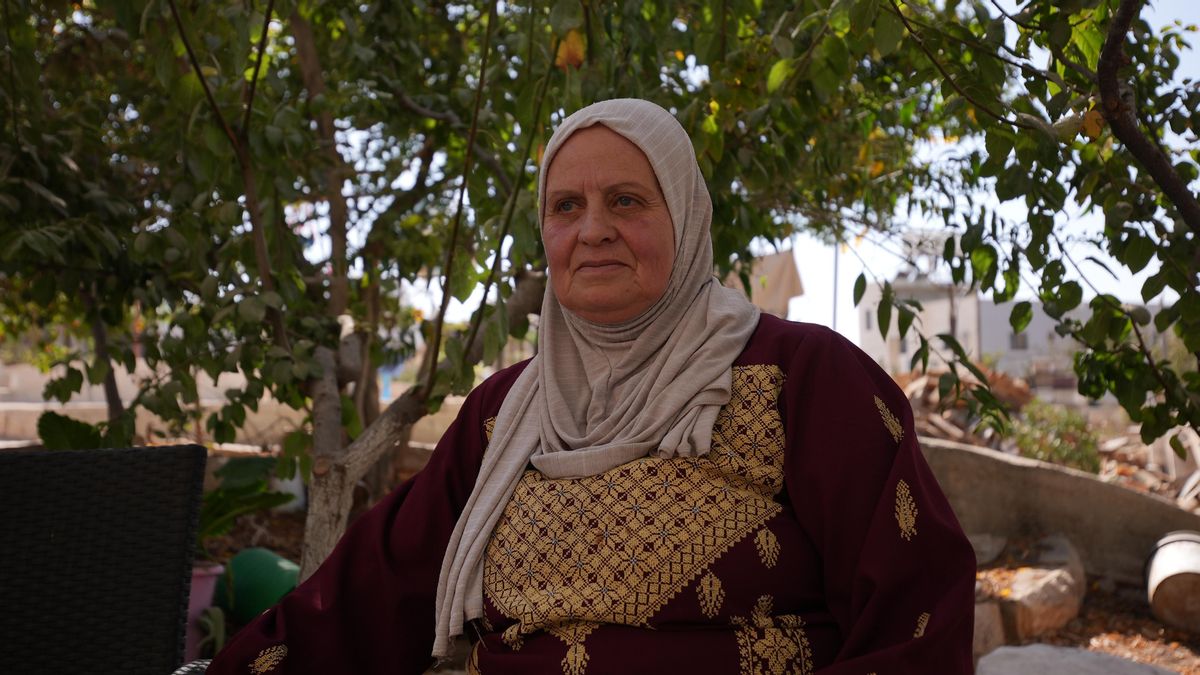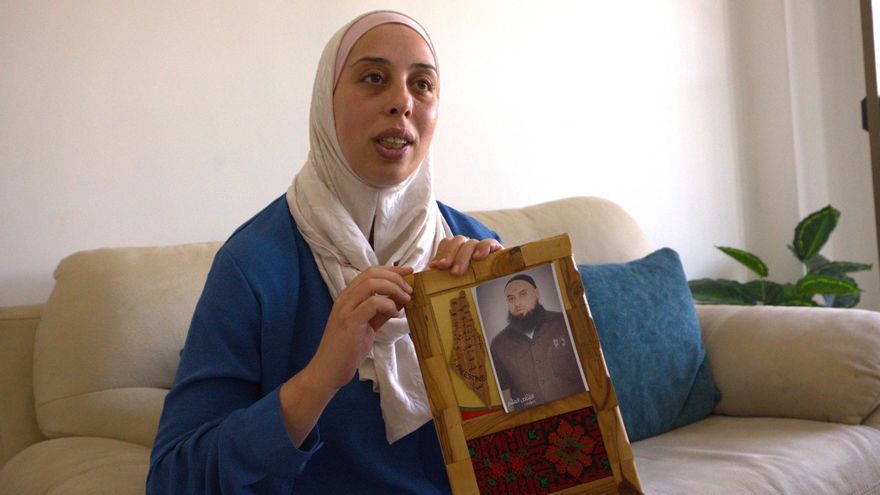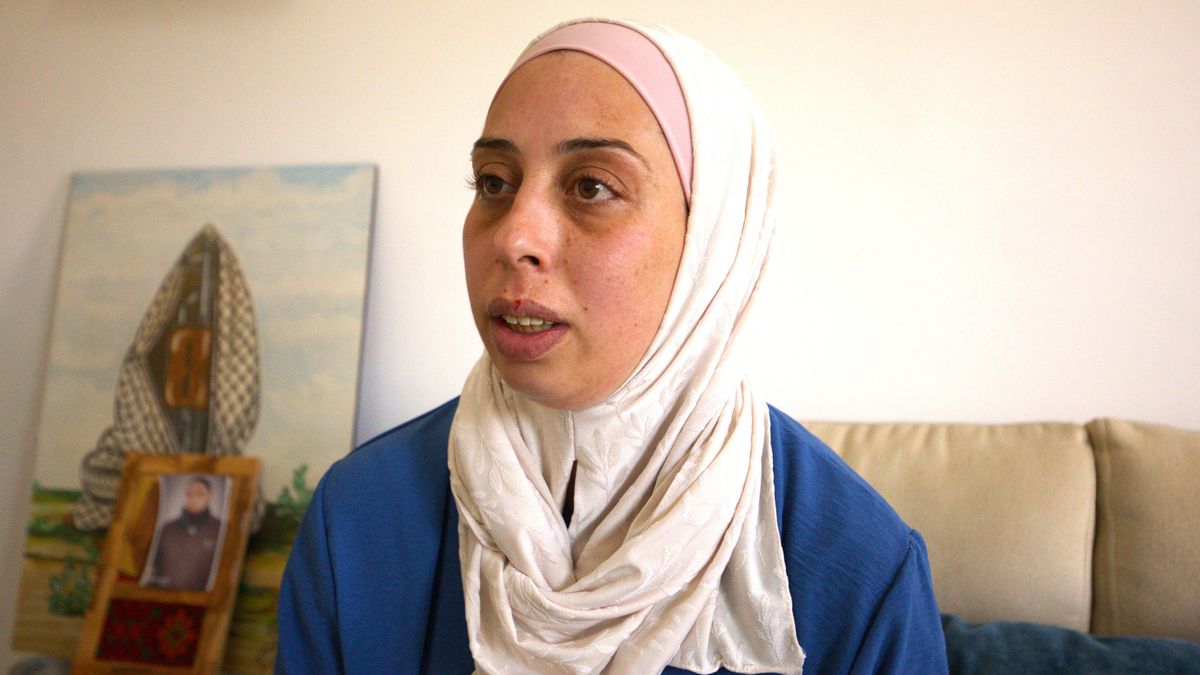Izz al Din Al Hamamrah has been in prison for 21 years, sentenced to several life sentences for planning attacks against Israelis during the Second Intifada. But next week he could be released under the ceasefire agreement in Gaza, by which Israel will release some 200 Palestinian prisoners with long sentences and another 1,700 detained in the Strip in exchange for Hamas returning the 48 hostages who have been held captive since October 2023.
“We hope that at any moment he will come out, we are waiting, but we do not have confidence in the Israeli government,” says Izz al Din's mother, Jadra. He receives elDiario.es at the family home in the village of Husan, west of Bethlehem, along with several family members. Everyone is waiting after Izz al Din's name appeared on the list of prisoners that the Israeli authorities have approved for the exchange. However, there may be changes and Izz al Din is one of the prisoners who will be deported directly once they are released because they are considered a “threat.”
The 64-year-old woman travels to Jordan this Sunday and will wait there for news of her son, the oldest of the eight she has (six girls and two boys). If he is deported to Egypt, he will go to that country from Jordan (as a Palestinian resident in the occupied West Bank, he cannot travel from the Israeli airport in Tel Aviv, but has to cross the border with Jordan and fly from Amman). Jadra goes alone because it is more difficult for the Hebrew authorities to cause problems for her at the border as she is an older woman.
We have not heard from him for two and a half years, without being able to visit him or hear his voice.
Mother of Palestinian prisoner Izz al Din Hamamrah
“We haven't heard from him for two and a half years, without being able to visit him or hear his voice (on the phone), since six months before October 7,” says the mother of the prisoner, who is now 46 years old. The family's lawyer was able to visit him in jail about two months ago and said he had lost a lot of weight. Israel has banned almost all visits to Palestinian prisoners – more than 10,000, including minors – after the Hamas attacks of October 7, 2023 as collective punishment, while carrying out genocide in Gaza.

“My son studied, he was a lawyer and he has lost all his youth. I thank God if he can finally get out, but I am sad for all those who stay (in prison) in very difficult circumstances, they are all my children,” says the woman who wears a maroon-colored tunic with traditional Palestinian embroidery.
The family gathers around Jadra, one of her daughters serves coffee and tea, the men smoke cigarettes and everyone shares the worry and uncertainty after the disappointment they experienced at the beginning of the year. Izz al Din, affiliated with the Palestinian movement Al Fatah, then appeared on the list of prisoners who were to be released in exchange for hostages under the previous agreement between Israel and Hamas in January 2025.
I thank God if my son can get out of prison, but I am sad for all those who remain in very difficult circumstances
Mother of Palestinian prisoner Izz al Din Hamamrah
They were waiting from January, when the ceasefire in Gaza came into effect, until the end of February, and he was finally not released, even though the Israeli authorities had informed the family that he would. The army even came to their home to warn them not to organize liberation celebrations. Only later did they learn through Hebrew media that Izz al Din had refused to be deported without guarantees that he would be able to return to Palestine at some point.
Uncertainty until the last moment
This Saturday, all the Palestinians who are going to be exchanged for the hostages have begun to be transferred: to the Ofer prison those who will be released in the West Bank and to the Ketziot prison those who will return to Gaza or those who will be deported to Egypt. Gazans are the majority, 1,700 who have been detained by Israel during its offensive in the Strip and who have not been tried. The other around 200 are almost all from the occupied West Bank and some from East Jerusalem.
Izz al Din's sister, Rimah Al Hamamrah, says that the message was sent to her, through the lawyer, to accept deportation, as it is the only way for her not to spend the rest of her life in prison. “He is considered one of the dangerous ones,” adds the 37-year-old woman who appears strong and determined, but admits that the situation is very difficult. “I have mixed feelings: nervousness, joy, worry, sadness, it is very difficult. The pain prevails over all the others,” he explains to this newspaper while holding a photograph of his brother.

Rimah details that he was sentenced to nine life sentences for being behind different armed actions during the Second Intifada, such as the explosion of a bus in which Israeli soldiers were traveling in 2002, but he assures that he never perpetrated or participated in the attacks, he only planned them.
She was very young when her brother was arrested, she does not have many memories of family life with him because Izz al Din went to study at university in Jordan and, when the Intifada broke out (in 2000), she spent a lot of time away from home, working as a lawyer and also in the Palestinian Authority. Four years later, before the uprising in the Palestinian territories ended, he was imprisoned. “He continues to treat me as if I were still 16 years old, as if I had not grown up. The relationship with him is strange, but there is brotherly love, there is respect, but we have not lived together,” he says.
He is an example for us and our children. Always fight until the last moment against the occupation
Sister of Palestinian prisoner Izz al Din Al Hamamrah
Before October 7, the family could talk to Izz al Din and visit him every two weeks or a month, but the visit lasted only 45 minutes. “We couldn't know much about him, about how his way of thinking had changed in prison, nor could he know how our life had changed outside. We felt he was close, but at the same time very far away.”
Rimah affirms that Izz al Din, despite being absent for 20 years, has had a great influence on the family: “He is an example for us and our children, we try to raise them to follow his example.” “He always fights until the last moment against the (Israeli) occupation. The greatest form of resistance is to say 'no' to the occupation and he did so when he refused to be deported,” he adds.

The price of resistance
“Resistance is in our genes, my grandfather participated in the fight against the British (during the protectorate of Palestine),” he says. “My brother tried to do what he could in the face of injustice, every free person looks for a way to resist. We never saw him carrying a weapon, he was always dressed in a suit and with his lawyer's briefcase.” The woman affirms that the entire family is proud of her brother but has paid a high price that, she emphasizes, has been worth it.
“We have to pay a high price to liberate Palestine. We are paying the price so that our children and grandchildren live in peace and not in injustice,” says Rimah. Despite the circumstances and admitting that Israel is much stronger, he assures that “generation after generation after generation, Palestine will be free.” And those future generations “have to know that we are not silent in the face of the occupation.”
There are many people who have paid with their lives or with prison, but all of us also pay a price because we live in a big prison, we have no freedom.
Sister of Palestinian prisoner Izz al Din Al Hamamrah
“There are many people who have paid with their lives or with prison, but all of us also pay a price because we live in a big prison. We have no freedom, the (Israeli) army can prevent me from passing through a street, from returning to my house…” says Rimah in reference to daily life in the occupied West Bank. “We have no freedom to express ourselves or to wish for Palestine to be free,” he adds. An example of this is that, just four months ago, another of the eight Al Hamamrah brothers was arrested. Shirin, several years older than Rimah and the second after Izz al Din, was arrested for some posts on social networks against the war in Gaza and in favor of Palestinian prisoners.
Rimah considers it a collective punishment for the family that has always been in the spotlight, since Izz al Din was convicted. “We are the family of a prisoner, but we are not afraid,” he says, laughing. Izz al Din's nephews, Ayham and Abdel Jaleq, aged 24 and 22, also say that they are not afraid but they know that there is a greater chance of being detained than other young Palestinians at Israeli checkpoints, which hinder and monitor the movements of the population in the West Bank. They don't know their uncle, because they were babies when he was imprisoned, but they admire him and hope to meet him in person soon.
“I want to meet him because I am proud, he is a person who has given his life for the country,” says Ayham. “I don't know if I will be able to go see him in Egypt, I don't know if they will let me. They may not give me permission to travel to Egypt or to leave the West Bank. This is our life,” he laments.